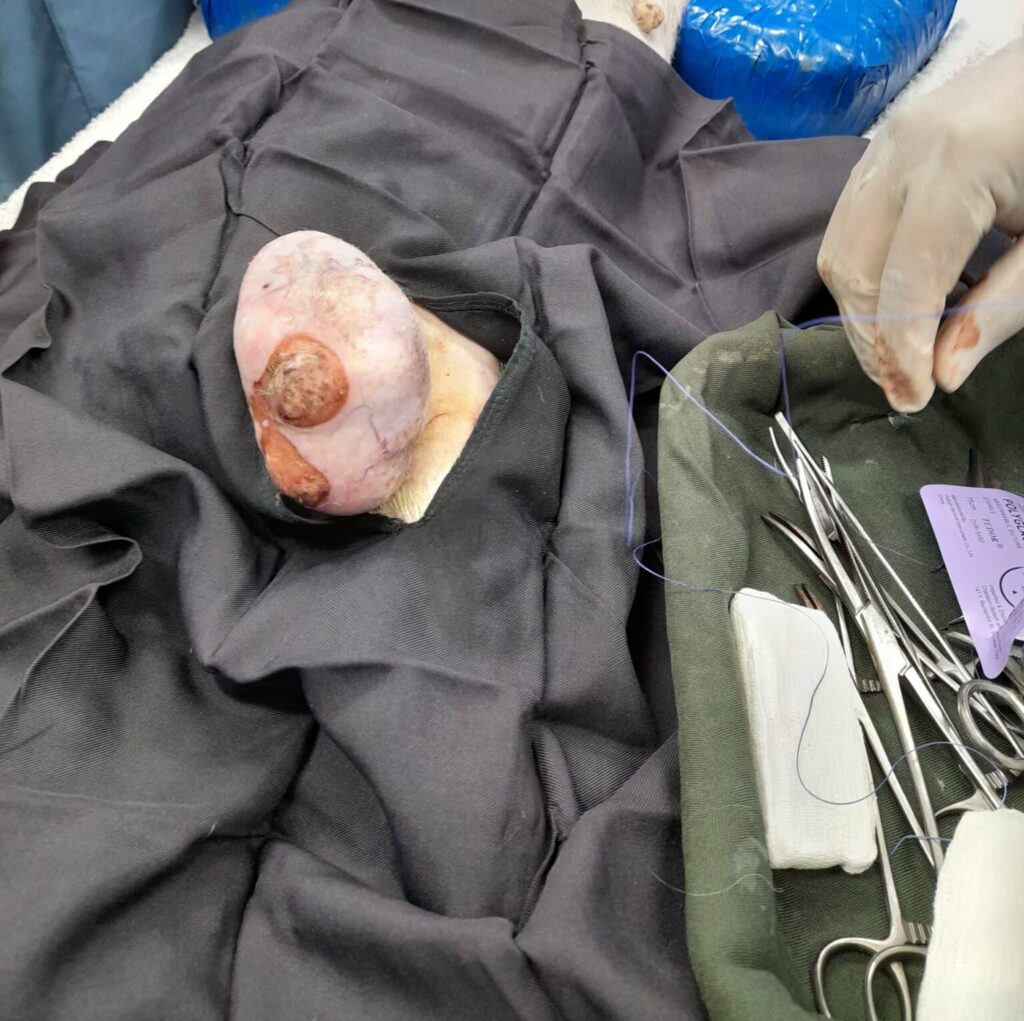TVT is a disease which affects some of the IWCT rescue dogs and has also been diagnosed in some of Josie’s dogs. Josie is the homeless lady whose dogs’ spay surgeries are being paid for by IWCT. This blog explains what TVT is, how it is contracted and how it can be treated.
What is TVT In Dogs?
TVT or Transmissible Venereal Tumours are a malignant type of cancer in dogs.
TVT forms cauliflower-like masses that range in size from small (less than 5 mm in diameter) to large (more than 10 centimetres in diameter). The tumours are usually formed on the external genitalia of dogs. However, they can also appear in other areas, such as the skin, nasal, or oral cavity.
How is TVT Contracted In Dogs?
The tumour cells are usually passed from dog to dog during breeding. They can also be transmitted through licking or sniffing.
The tumours are slow growing. This means that a dog who has been spayed could still present with TVT after their operation, if they were sexually active prior to being spayed. Furthermore, if they came into contact with a dog who had TVT, there is a chance they could contract it through skin contact or sniffing, despite being spayed.
Symptoms of TVT In Dogs:
Dogs with masses presenting in the genital region may have the following symptoms:
- Masses that are grey or pinkish in colour
- Masses which bleed easily
- Dogs urge to lick genitals
- Swelling of genitals
- Masses with firm. Cauliflower like appearance
As mentioned above, TVT can develop on the skin or around the nose and mouth too. Signs a dog has TVT in these areas include:
- Bleeding from the nose
- Sneezing
- Sores on the gums or in the mouth
- Bad breath
- Excessive drooling
- Tooth loss
- Nodules on the skin can become open sores and nearby lymph glands can become swollen
Diagnosis And Treatment
Diagnosis of TVT in dogs is done by a qualified veterinarian under clinical examination. They may take a few cells from a tumour using a small needle or scrape some cells onto a slide. The samples are sent to a laboratory for testing to confirm TVT.
Treating TVT
Depending on the size and location of the tumour and the number of tumours a dog has, surgical removal may be possible. If the dog has multiple masses in hard to reach areas like in the nose or the genitals, chemotherapy is the preferred treatment option.
Chemotherapy can either be injected directly into the tumour as a one off treatment or it can be given intravenously (into a vein on the dog’s body) as a course of treatment once a week for several weeks. These are known as cycles of chemotherapy and are considered when a dog has lots of tumours and there is concern that the tumours may have spread to other parts of the body. Pet MD has more information about the type of chemotherapy drugs used.
The cost of the chemotherapy treatment in the Philippines is almost 7,000 PHP or £100. That doesn’t include other veterinary procedures such as diagnosis, admission, follow up appointments, etc.

Prognosis of TVT
If caught early and the veterinary recommended treatment path is followed, the prognosis is good for otherwise healthy dogs with TVT. There is no reason why they shouldn’t have a normal life and reach old age. If left untreated however, the disease can be fatal.
Preventing TVT
Having your dog spayed or neutered from an early age will reduce the risk of it catching TVT as it won’t become sexually active. Preventing your dog from roaming will also significantly reduce the chances of it contracting the disease, for it will not come into contact with unknown dogs. These Responsible Pet Ownership practices will not only save you on veterinary costs, it will prevent unnecessary suffering for your dog.
At IWCT, we run a free weekly consultation clinic. Here pet owners can bring their dog or cat for regular check ups. By doing so, ailments and illnesses can be spotted early on. Early intervention and regular checks will make for better prognosis for your pet.
How You Can Help
If you like the work we do and would like to support us, please consider making a donation so we can help more responsible pet owners in need in the Philippines.